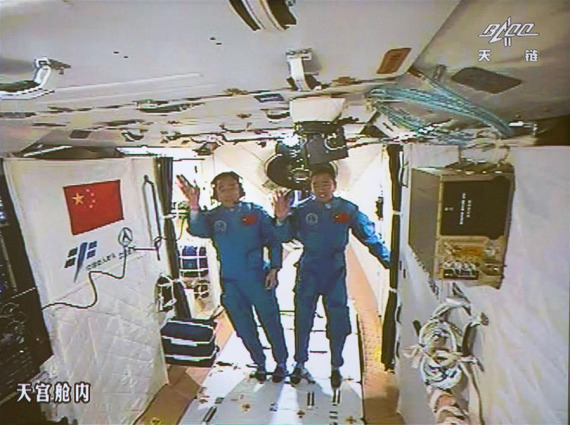
Photo taken on Oct. 19, 2016 shows the screen at the Beijing Aerospace Control Center showing the two Chinese astronauts Jing Haipeng (L) and Chen Dong waving hands in the space lab Tiangong-2. (Photo: Xinhua/Ju Zhenhua)
The successful automatic docking of China's Shenzhou-11 spacecraft with Tiangong-2 space lab Wednesday takes China one step closer to its dream of building a space station. World media have been paying great interest in the event.
The official Rossiskaya Gazeta has been continuously reporting the launch of Shenzhou-11 and the docking.
The newspaper also recalled China's aerospace achievements since the country's first manned space flight in 2003. China's aerospace development is among the tops of the world, and along with its promising aerospace plans, the country will become one of the most advanced aerospace countries in the world, the newspaper said.
Russia's newspaper Parlamentskaya Gazeta said that China is to build a permanent space station starting from 2018, and prepares to invite foreign astronauts to live at it. Some prospective European astronauts have started to learn the Chinese language.
Russian Ktovkurse website released a long piece introducing China's aerospace achievements. The article pointed out that, although veteran aerospace countries have spent decades exploring space, China is using its latecomer's advantage to surpass them -- China uses the latest aerospace technologies to achieve symbolic aerospace achievements in a leapfrog manner, the website explained.
As China keeps making progress in aerospace, the U.S. aerospace industry, which used to refuse to cooperate with China, is now getting uneasy. Some retired American astronauts and some congressmen have called on decision-makers to make a change, the website pointed out.
Russia's renowned gazeta.ru website pays special attention to the series of scientific experiments Chinese astronauts are about to do at the Tiangong-2 space lab.
It specifically introduced the space-to-ground quantum communication jointly conducted by Tiangong-2 and China's newly launched quantum satellite "Micius."
Some Russian netizens hailed the Chinese achievements. Some sighed,"China is surpassing us."
Japan's Kyodo news agency reported the scientific experiments to be conducted in the Tiangong-2 space lab, pointing out that the program is aimed to enhance China's technological capability to independently build a space station.
The Chinese government is promoting the target of constructing itself to be a strong aerospace state, and striving to develop manned aerospace projects. Therefore, this mission is considered as an important step toward space station construction, and is conducive to other space explorations such as moon landing.
Japan's Jiji Press reported that docking is indispensable for sending staff and supplies to space station, and China's aim is to test and accumulate technologies and experience through this mission.
Euronews, a multilingual news media service headquartered in Lyon, France, said on its website that the taikonauts, Jing Haipeng and Chen Dong, will live in the space lab for 30 days, setting a record of the country's manned space program and striding an important step toward closing the gap with advanced countries in exploring space.
Germany's Diet Welt newspaper published a photo of China's launch of Shenzhou-11 with wishes printed in Germany on the photo "Wish China luck in flight." The photo was captioned "China has launched the next stage of its ambitious aerospace plan."
Sueddeutsche Zeitung newspaper also agreed that China has made a step closer toward being a strong country in space.
Neues Deutschland reported that China could be the only nation with a space station with the current U.S.-led International Space Station expected to retire in 2024.


















































